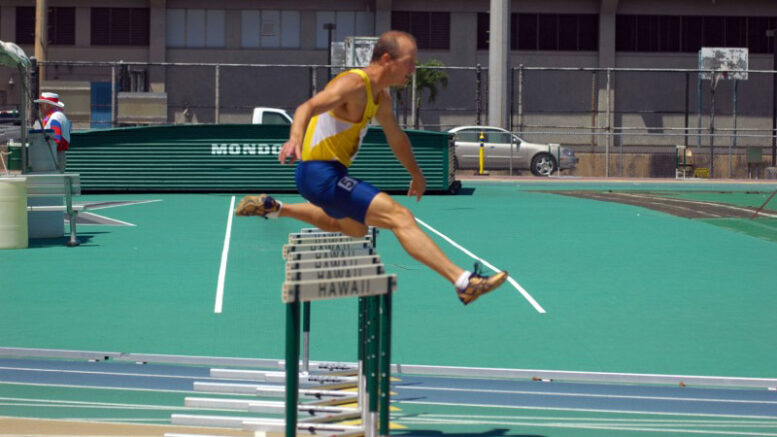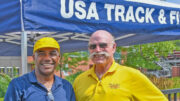For six years, Jeff Brower of Texas has been chair of the USATF Masters T&F records committee. He cleaned up a holy mess left by Sandy Pashkin, whose failures I noted over the years (including a 2006 post headlined “Sandy Pashkin, as roadblock to records, has to go.”) Sandy inherited an index-card system from Pete Mundle, a booger beyond belief. Jeff also helped update the MTF website, finally adopting a WordPress design. (Easier to use.)
And in 2020, according to his annual report, Jeff didn’t take a dime from his $3,000 budget.
Now Jeff is stepping down. Our fourth records czar hasn’t been revealed.
Last month, Jeff challenged Jerry Bookin-Weiner for chair of USATF Masters T&F Committee. Jeff lost badly and had legit issues with the process. Today, Jeff explained why he wasn’t seeking to re-up as records chair: “I told Jerry on 12/6 that I would not apply for the position, and he never asked me to consider continuing. I don’t want to work in a ‘culture’ like Jerry cultivates.”
Jerry, meanwhile, is putting out a call for chair applications. Deadline is Tuesday, Jan. 5. But it’s being extended. (Apply here.)
Most of 2020’s subcommittee chairs will likely return in 2021, though. Jerry’s also seeking to expand diversity of committees. He prefers to call it inclusion efforts.
Before hearing from Jeff, I wrote Jerry to check the status of his chair search.
Here’s our quickie Q&A:
Masterstrack.blog: How many subcommittees have chair applicants? How many left to fill?
Jerry: All have applicants.
Is Jeff Brower likely to keep masters records chair job?
Jeff will need to respond to that question; I am not going to reveal who is applying for various positions publicly.
Besides social media, how is USATF Masters T&F publicizing the chair opportunities?
All identifiable masters athletes who attended the annual meeting received a follow-up email including a link to the post on usatfmasters.org and explanation of the process; some others who we knew had interest were contacted directly by one or another of the officers; and there is an item in the Masters Newsletter from USATF that was supposed to go out before the Christmas break (it didn’t); and, of course, the post on usatfmasters.org. We (the officers) have also been reaching out to people we have identified as potentially interested who we think would be good additions to the leadership/membership group.
Will you be making chair picks, or will it be done by vote of other Exec Committee members?
Interviews will be conducted by the MTF Officers as a group who will do the selection by consensus after discussion with those applying; they must be approved by the Executive Committee (per the Operating Procedures)
What benefits do chairs get? (What’s the appeal of being a chair?)
The appeal is different for each individual. I can only speak for myself in that when I was a chair and a regional coordinator it was to carry on the work of our sport; without people doing that work our sport would collapse — in other words, giving back to the sport.
Anything else readers should know about this process? Will deadline be extended?
Because the newsletter is late, we will likely accept any applications that come in during the coming week or so. However, it is our goal to complete the process, including approval by the Executive Committee, by the end of the month.
Jerry added: “To your subsequent question about the role of diversity in this process, that is not a term we use. We talk of inclusion – inclusion of people of various ages, genders and ethnic backgrounds, as well as those from various regions of the country and involved in various disciplines within our sport. We want the leadership and the membership of the subcommittees to be representative of the MTF community.”
With help from Vice Chair Robert Thomas, Jerry put together a video session on how Black masters have dealt with racism. It has fewer than 100 views on YouTube. It deserves better attention.
In any case, I salute Jeff for his hard work vetting and publicizing USATF master records — creating annual Google docs — here’s 2020 indoors and 2020 outdoors — showing the status of applications. He even gave old marks new scrutiny, such as W40 800 and 1500 marks by Ruth Wysocki in 1997 that Sandy Pashkin disregarded (despite my best efforts). Ruth now owns two American age-group records.
I hope the next chair carries on that record of reliability and professionalism.
Contribute to support independent track and field journalism:






i’ll second the gratitude for jeff–he helped me ratify an american record 4 years after the fact by cutting through archaic red-tape. he was supportive and easy to deal with, and i’d have no official record without him…
Jeff was instrumental in my refreshing the USATFMasters website and moving it to WordPress a few years ago. I greatly appreciate his help and support in all the work we did on USATFMasters.org!
Jeff’s comment about Jerry’s “culture” is concerning. I know that personality conflicts sometimes can’t be avoided, but Jeff’s contributions over the years have been invaluable and it’s a sad thing that differences can’t be worked out. Whoever replaces him has big shoes to fill. Thank you Jeff for all your hard work. USATF masters track was lucky to have you.
Following up on the comment by Christian Cushing-Murray (above), I will congratulate Jeff Brower on his service and then make a statement I have made before. In masters T&F we need standards for records that are very sensitive and at the same time very specific. Note: In medicine we consider a diagnostic test to be very sensitive if almost everyone with disease or condition X tests positive; we consider a test to be very specific if almost no one who does not have disease or condition X tests positive.
In my view, our standards for records are extremely specific, as we hardly ever call something a record if it is not. We do, however, lack sensitivity. As just one example, in April 2016 the great Alisa Harvey (at age 50) drove all the way from Virginia to Iowa to compete in the special masters 800 at the Drake Relays. She brought a record form with her, but through no fault of her own it was never completed. Alisa’s time was 2:20.32, easily better than the still-standing 2:21.98 established as the W50 record by the wonderful DeeDee Grafius in the previous century.
I do hope that Alisa’s mark will be accepted as the W50 standard by the new masters records chair. After all, this was at the world-famous Drake Relays, and there would have been no reason to give her 2:20.32 if she had not actually run that time.